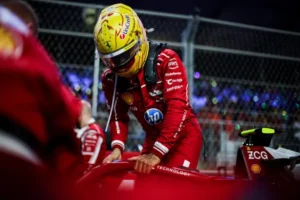Just in:Verstappen FUMES at stewards as FIA announce disqualification at Abu Dhabi Grand Prix after……read more

Verstappen FUMES at stewards as FIA announce disqualification at Abu Dhabi Grand Prix after……read more
The Abu Dhabi Grand Prix delivered a dramatic and controversial end to the Formula 1 season, with Max Verstappen expressing strong frustration after the FIA announced his disqualification. The decision came after Verstappen’s car failed post-race technical inspections, with modifications found to be in violation of current regulations. This penalty not only impacted Verstappen’s result but also affected his team, Red Bull Racing, which had already faced challenges during the final races of the season.
Verstappen, who had been aiming to cap off a record-breaking season with another victory, did not take the ruling lightly. In a visibly heated reaction, he criticized the stewards and the FIA, calling the penalty excessively severe and unfair. He argued that the disqualification was a blow to the integrity of the championship, suggesting that it could undermine the credibility of the entire season. The incident sparked widespread debates among fans, analysts, and commentators about the consistency of FIA rulings and whether they were applied fairly across all teams. Many questioned if Verstappen’s penalty was disproportionately harsh, especially given his dominant performance throughout the year.
The disqualification not only overshadowed Verstappen’s season finale but also drew attention to the broader issue of technical inspections and their implications for competitive fairness in Formula 1. It raised questions about how strictly the FIA enforces regulations and whether such decisions are made with enough clarity and transparency. Fans who had been anticipating an exciting finish to the season were left bewildered, while others questioned whether Verstappen’s frustration was justified. The controversy was compounded by the fact that Verstappen had already claimed the world title, so the penalty seemed particularly impactful given his already stellar performance throughout the year.
As the Verstappen controversy unfolded, another key figure in the F1 world was making headlines. Lewis Hamilton, finishing his final race for Mercedes, chose to request the removal of a planned farewell tribute on his car. Hamilton explained that he preferred to focus on team achievements rather than personal milestones, demonstrating his humility and team-first mentality. This moment was a significant one for Hamilton, who had spent much of his career at Mercedes, and his decision to keep the attention on the team’s accomplishments resonated with many fans. The race itself, while marked by drama surrounding Verstappen’s penalty, was also a moment of reflection for the seven-time world champion as he prepared to transition to a new chapter in his F1 career.
In the midst of the Verstappen disqualification, McLaren emerged as an unexpected beneficiary. With the drama surrounding Verstappen’s penalty, McLaren was able to capitalize and secure an unexpected constructors’ championship win. This marked McLaren’s first title in over two decades, a remarkable achievement that highlighted the team’s resurgence. Lando Norris and Oscar Piastri, both of whom had shown impressive form throughout the season, played pivotal roles in helping McLaren secure the championship. Their performances, along with the chaos caused by the disqualification, provided McLaren with the opportunity to make history and end the season on a high note.
The events at the Abu Dhabi Grand Prix have sparked broader discussions about the FIA’s regulatory processes and the impact of such decisions on the sport’s reputation. The controversy surrounding Verstappen’s disqualification raised concerns over the consistency and transparency of technical inspections, and it remains to be seen how the FIA will address these issues going into the offseason. Both Red Bull Racing and Verstappen are expected to seek clarification or potentially lodge an appeal regarding the decision, further fueling debates about the integrity of the sport.
As the Formula 1 world moves into the offseason, the ripple effects of the Abu Dhabi Grand Prix are sure to influence the narrative for the upcoming 2025 season. Fans and teams will be watching closely to see how the rivalries evolve and whether the controversy over the Verstappen disqualification will shape the future of F1. Meanwhile, with McLaren’s triumph, the constructors’ championship title race is likely to become more competitive, and all eyes will be on how teams prepare for the next season amid such a charged atmosphere.





